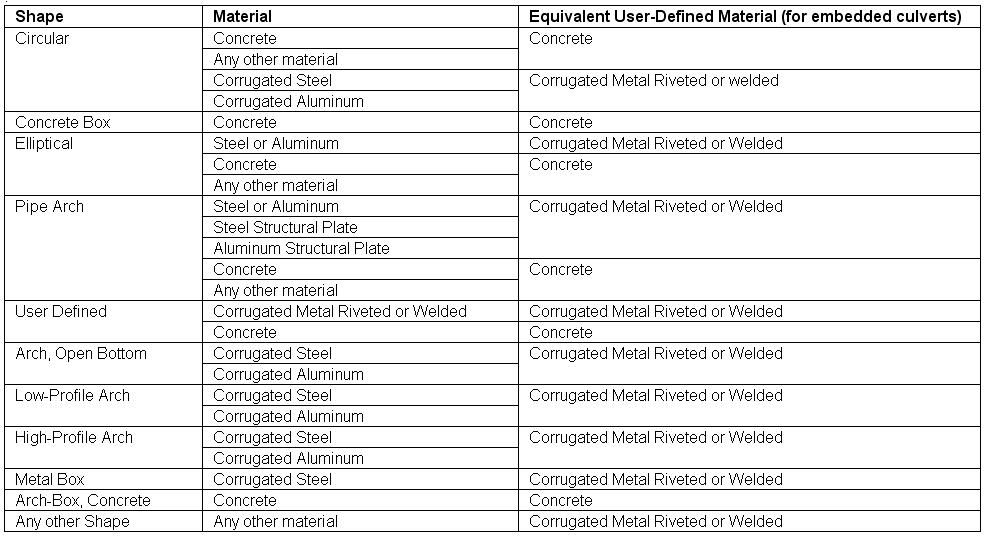HY8:Embedment Depth: Difference between revisions
No edit summary |
No edit summary |
||
| (7 intermediate revisions by 3 users not shown) | |||
| Line 1: | Line 1: | ||
“Embedment Depth” is the depth the culvert is embedded from the invert of the culvert barrel to the top of the embedding material. | “Embedment Depth” is the depth the entire culvert is embedded from the invert of the culvert barrel to the top of the embedding material. | ||
If an Embedment Depth greater than zero is entered, HY-8 will run the culvert analysis as if the input parameters were entered as a User Defined shape. If the culvert is embedded, HY-8 will determine the coordinates of the shape and use these coordinates in the User Defined equation. Because of this, if the culvert is embedded, only the User Defined Inlet Types and Inlet | If an Embedment Depth greater than zero is entered, HY-8 will run the culvert analysis as if the input parameters were entered as a User Defined shape. If the culvert is embedded, HY-8 will determine the coordinates of the shape and use these coordinates in the User Defined equation. Because of this, if the culvert is embedded, only the User Defined Inlet Types and Inlet Configurations will be available. This is a significant difference from the computations for non-embedded culverts for the Circular, Concrete Box, Elliptical, and Pipe Arch shapes. For these shapes, non-embedded culverts use 5th-degree polynomial coefficients to compute the inlet control depth. However, if the culvert is embedded, the inlet control depth is interpolated based on a set of interpolation coefficients for User Defined culverts. | ||
In HY-8 version 7.3 for embedded circular culverts, HY-8 uses the 5th-degree polynomial to determine the inlet control depth. The coefficients used are derived from the NCHRP 15-24 report. This report gives coefficients for a circular culvert that is embedded 20%, 40%, and 50%.. HY-8 will linearly interpolate between the coefficients for the level of embedment specified; however, if the embedment is outside the range of data, the closest set of coefficients is used. The polynomial coefficients are available here: [[HY-8:Polynomial Coefficients|Polynomial Coefficients]]. | |||
Define top and bottom Manning’s n values to handle the embedding material properties and HY-8 uses these values to run the culvert analysis. | |||
Finally, if | Finally, if the user enters an embedment depth, all the materials for the selected shape will still be available. However, the material selected will be converted to one of the two user-defined materials using the following chart: | ||
[[Image:HY8EmbedmentDepth.jpg]] | [[Image:HY8EmbedmentDepth.jpg]] | ||
| Line 17: | Line 18: | ||
{{HY8Main}} | {{HY8Main}} | ||
[[Category:Culvert Data|E]] | |||
Latest revision as of 22:12, 28 February 2018
“Embedment Depth” is the depth the entire culvert is embedded from the invert of the culvert barrel to the top of the embedding material.
If an Embedment Depth greater than zero is entered, HY-8 will run the culvert analysis as if the input parameters were entered as a User Defined shape. If the culvert is embedded, HY-8 will determine the coordinates of the shape and use these coordinates in the User Defined equation. Because of this, if the culvert is embedded, only the User Defined Inlet Types and Inlet Configurations will be available. This is a significant difference from the computations for non-embedded culverts for the Circular, Concrete Box, Elliptical, and Pipe Arch shapes. For these shapes, non-embedded culverts use 5th-degree polynomial coefficients to compute the inlet control depth. However, if the culvert is embedded, the inlet control depth is interpolated based on a set of interpolation coefficients for User Defined culverts.
In HY-8 version 7.3 for embedded circular culverts, HY-8 uses the 5th-degree polynomial to determine the inlet control depth. The coefficients used are derived from the NCHRP 15-24 report. This report gives coefficients for a circular culvert that is embedded 20%, 40%, and 50%.. HY-8 will linearly interpolate between the coefficients for the level of embedment specified; however, if the embedment is outside the range of data, the closest set of coefficients is used. The polynomial coefficients are available here: Polynomial Coefficients.
Define top and bottom Manning’s n values to handle the embedding material properties and HY-8 uses these values to run the culvert analysis.
Finally, if the user enters an embedment depth, all the materials for the selected shape will still be available. However, the material selected will be converted to one of the two user-defined materials using the following chart:
